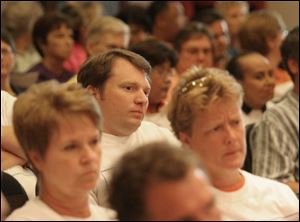
Uptown housing proposal examined
8/10/2005
William Black, a supporter of Neighborhood Property Inc., listens at a Toledo City Council meeting. An Uptown housing proposal was among the items on council s agenda.
Advocates for housing for the homeless as well as those representing business interests in the Uptown area near downtown Toledo crowded City Council chambers last night, bringing with them their distinct - and at the moment disparate - visions for the area's future.
About 100 people wearing T-shirts with such slogans as "Won't you be my neighbor?" and "Blessed is he that considereth the poor" sat in support of a Neighborhood Properties Inc.-backed proposal to get zoning clearance for a 13-unit residential building to be built at 219 21st St. in the Uptown area.
The building would house chronically homeless people and those with mental illness.
City zoning restrictions require apartments in the area to be located on the second floor or above, while the first floor must be used for commercial purposes.
Such buildings may have no more than 10 units.
Members of Neighborhood Properties say they have no need to build any commercial space, and building a two-story building would add additional, unnecessary expense.
Coincidentally, members of the Uptown Association, a collection of business owners in the area, were on hand to witness the establishment of a Community Entertainment District surrounding the very same area.
The 230-acre district would extend from Michigan Street to Collingwood Boulevard, and roughly from Jackson Street to Washington Street.
It would allow for 15 discounted liquor licenses to be sought from the state by new business owners and lay the boundaries of an "arts and entertainment village" the association hopes to market.
During a previous council meeting, members of the association lamented the lack of market rate, rather than supportive, housing in the area.
Outside council chambers, the two groups agreed to meet to discuss the residential building before the next council meeting on Aug. 23, when the zoning matter likely will be put to a vote.
J.P. Smith, board president of the Uptown Association, said his board already voted against the residential building, but said he didn't think it heard from all sides.
Jacqueline Martin, executive director of the Lucas County Mental Health Board, working with Neighborhood Properties, said she was encouraged by the discussion, but would continue her quest to get the residence built.
The supportive housing group said it must get council approval before the end of the month or it will lose $400,000 in state funding.
In other business, council sent a "point of sale" ordinance proposed by the Ford administration to council's community and neighborhood development committee, of which Michael Ashford is chairman.
The law would require Toledo residential property owners to get a building inspection and have any violations addressed before selling.
Those who don't follow the law could be charged with a first-degree misdemeanor, which carries a maximum penalty of six months in jail and a $1,000 fine.
Mr. Ashford said yesterday he would put together an eight-person task force, complete with an independent "mediator," to review the legislation and make recommendations.
Council also heard a "first readings" of proposals to:
●Alter the boundary between Toledo and Oregon to allow a coke processing plant to be located within the Toledo corporate limits.
●Establish an economic partnership between the cities that would split the income-tax and property-tax revenues that would flow from the construction work and the 150 to 200 permanent jobs at the site.
The split would last for 40 years, at which time it would be renegotiated.
A tentative agreement reached March 30 between the two cities' administrations established the "joint economic development zone" on 51 acres near Millard Avenue.
Contention arose after a review of property surveys showed that Duck Creek, the boundary between the two cities, had been artificially rechanneled over the years about 500 feet into Toledo territory.
The 51 acres represents the contested land, upon which the new coke plant would be placed.
Corresponding proposals also must be approved by Oregon City Council.